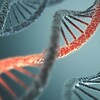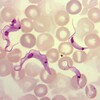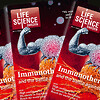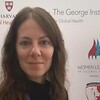-

Great Swedish innovations: Eye treatment became a feather in Pharmacia’s cap
From complicated and sometimes risky surgery to a routine procedure. Pharmacia’s injectable Healon revolutionised the field of eye surgery - and is considered by us one of the most important contemporary Swedish innovations in the field of medicine.
-

She creates pharmaceuticals on a 3D printer
The correct dosage for each individual, regardless of whether the pharmaceutical is for a seriously ill child or a frail elderly person, is the mission of a well-advanced project with 3D-printed drugs at Uppsala University. “It will soon be available in clinics”, says Christel Bergström, who is heading the project.
-

The stomach medication that became the biggest blockbuster of the 1990s
The omeprazole molecule was synthesised as early as 1979, but it took many years before the then Astra had an approved pharmaceutical. Once this happened, a tablet was available that was soon to help millions of people worldwide and break all sales records.
-

The most important Swedish medical innovations: Our ranking
Life Science Sweden turns 20 years old – and celebrates by producing a top list of the 20 most important contemporary Swedish innovations in the field of medicine.
-

Bought a tablet factory – and built his own empire
In 1995, Thomas Eldered was CEO of one of Pharmacia’s factories in the Stockholm area when the Swedish pharmaceutical giant, after a takeover, decided to move its production abroad. 34-year-old Thomas was facing an imminent risk of losing his job. However, instead, it actually turned out to be the starting point for one of the biggest success stories in Swedish life science.
-

Anna Törner: Kalashnikovs in a new guise
Thanks to resisting European regulatory authorities, Europe has been spared the opioid epidemic. In the 1960s, the situation was the opposite as the American pharmaceutical authority, the Food and Drug Administration (FDA), refused to approve thalidomide (Neurosedyn), writes Anna Törner in a column.
-

Newly discovered gene variant linked to protection against abdominal obesity
American researchers believe they have identified a rare gene mutation that protects against abdominal obesity and metabolic syndrome. The ambition is that the discovery will lead to new treatments that can help reduce the risk of type 2 diabetes and coronary artery disease.
-

Study: Our behaviour may have been guided by wishful thinking during the pandemic
A new study suggests that we systematically underestimate health risks if and when it suits us. This was especially true during the pandemic, as our risk assessments may have been guided by wishful thinking rather than a rational perception of the risks.
-

A growing industry in Denmark: “One new life science company a week”
The life science sector in eastern Denmark continues to grow in the number of employees, as well as the number of companies. An emerging problem is the shortage of labour, a new report reveals.
-

Angelica Loskog: ”Som barn var jag jättefixerad vid cancer. Där började mitt intresse”
Life Science Sweden vill veta mer om Angelica Loskog och ställer frågor om hennes liv som forskare.
-

Hello Angelica Loskog!
Life Science Sweden would like to know more about Angelica Loskog and interviews her about her life as a researcher.
-

Noxious parasite forms hybrids and deceives the immune system
The small parasite Trypanosoma cruzi has a nasty ability to cause serious illness. Researchers at the Karolinska Institutet have now mapped its ability to deceive the immune system by forming new variants that are mixtures of different strains.
-

40 miljarder i satsningar i Öresundsregionen – ”En enorm investeringsvåg”
Medicinska företag i Öresundsregionen investerar som aldrig förr, visar en ny rapport.
-

We will now publish more news in English – and offer yet another newsletter
Starting next week, Life Science Sweden will begin offering a newsletter entirely in English.
-

Samuel Lagercrantz: Immunterapin befinner sig fortfarande i ett tidigt stadium
I mer än 100 år har det funnits forskare som har försökt rikta kroppens eget immunförsvar mot cancerceller. Ibland har de blivit utskrattade och hånade av det medicinska etablissemanget. Men där vi står idag kan man ändå sammanfatta det hela med: skrattar bäst som skrattar sist, skriver Samuel Lagercrantz.
-

This is how Anette Steenberg will put Medicon Valley on the world map
Anette Steenberg has been CEO of the Swedish-Danish life science cluster Medicon Valley Alliance since 1 November last year. Life Science Sweden called her to ask about her visions and the challenges of merging the worlds of Swedish and Danish life science.
-

Marie Gårdmark: Finally, it’s time for a revision of the EU pharma legislation
A challenge for the EU Commission is to deliver a new framework that will also take care of another “pillar” of the pharmaceutical strategy, namely, to ensure that new medicines will be available for all citizens in Europe, writes Marie Gårdmark in a column.
-

Life Science Sweden´s international issue is on its way
A new issue of Life Science Sweden is on its way to print, packed with news, interviews and reports.
-

“Together Stockholm-Uppsala and Medicon Valley can make Scandinavia a leading life science region”
“Denmark, Sweden, Norway and Finland all have national life science strategies, but the Swedish strategy is the only one explicitly emphasizing the Nordic dimension. But what if the leading life science nations, Denmark and Sweden, joined forces, took the lead and pioneered Nordic life science collaboration? Wouldn´t we then be able to "bake a bigger cake?", writes Anette Steenberg and Ulf G. Andersson in a debate article.
-

The route to vaccines for everyone: “We did not just sit around and wait”
The pandemic was in full swing, and no one knew when or even if a vaccine would come. At that point, the Swedish Minister of Social Affairs called with a proposal, and Richard Bergström did not hesitate. “I already had a notion that this would work,” he says in an interview with Life Science Sweden.
-

Giulia Gaudenzi: Innovation for good
"I challenge the innovator landscape to take a mental leap. Relying on innovation-solely to end inequality is not enough, therefore consciously and purposively – we need to engage bravely with the politics of poverty and scarcity. Even in life sciences", writes Giulia Gaudenzi in a column.
Få tillgång till allt innehåll på Life Science Sweden
Ingen bindningstid eller kortinformation krävs
Redan prenumerant? Logga in
Gäller endast personlig prenumeration.
Kontakta oss för en företagslösning.